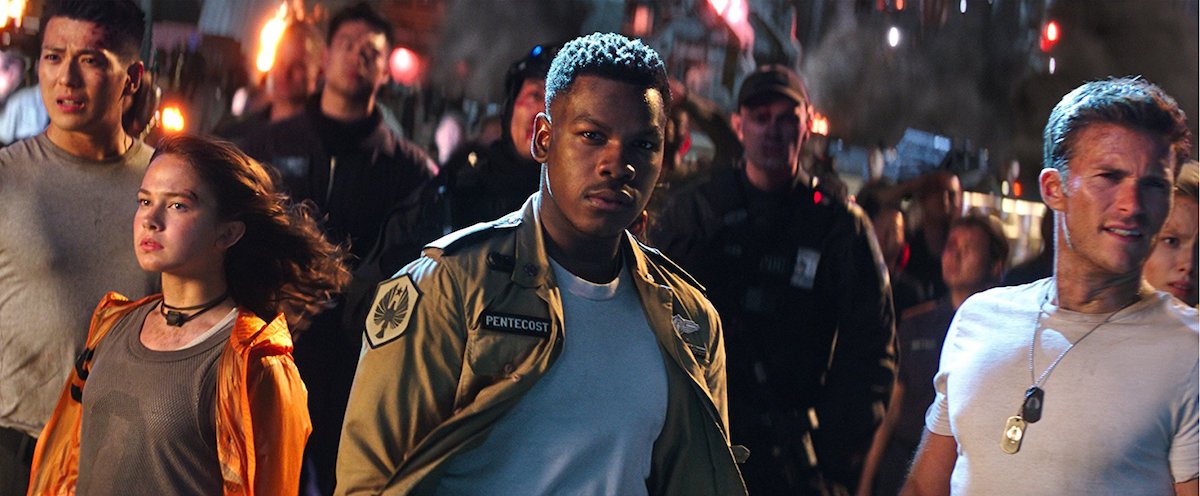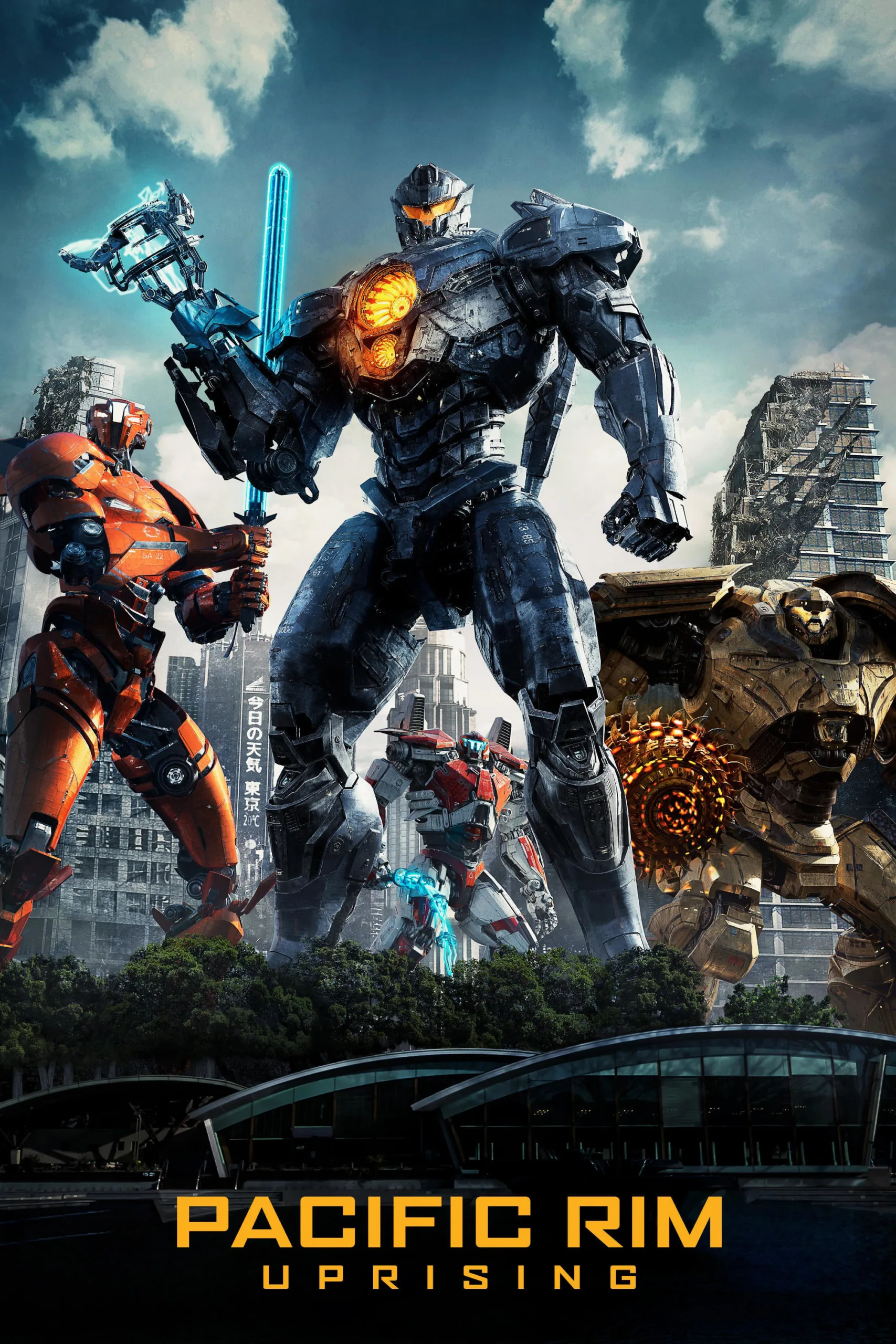I’m writing this review in a hurry because every hour I wait makes it harder to remember “Pacific Rim Uprising.”
On a craft level, this sequel to Guillermo del Toro’s monsters-versus-biomechanical warriors saga “Pacific Rim” isn’t terrible. At the very least, it doesn’t stint on images of huge things crashing into other huge things, as well as collateral damage in the form of cratering streets, collapsing buildings, and panicked civilians (who are shown racing away from the mayhem but rarely being hurt or killed). Set ten years later, the movie showcases giant gundam, or jägers, fighting a new kind of kaiju (I won’t go into details because it would spoil one of the film’s only surprises) and, for variety, jägers battling other jägers. Younger kids might like it, and it’s probably a safer bet for that age group than the “Transformers” films, which are strangely filled with racist and sexist images as well as a needlessly sleazy undertone.
And the cast is filled with actors doing everything they can to make their characters as memorable as possible even when the script (credited to four people) isn’t lending them the support they deserve. John Boyega, in particular, saves long stretches of the movie just by being his appealing self. Ever since “The Force Awakens,” he’s been honing a screen persona that owes a lot to the late James Garner—a funny, cynical survivor who makes a point of avoiding unnecessary fights and keeping one eye on the exit at all times, but who also has a buried streak of righteous honor that surfaces during dire moments. He’s operating in that mode here, playing Jake Pentecost, the pilot-turned-scrapper son of the original film’s inspirational warrior-guru Stacker Pentecost (Idris Elba). But there are two major problems, and the movie never manages to overcome either of them.
One is that the whole sequel storyline feels like a sad afterthought to the original, which saw various two-person crews of misfit eccentrics overcoming their animosities and neuroses to become one mind, operate their machines, and bash, smash and burn giant beasts who’d slipped through a dimensional portal at the bottom of the sea. To its credit, this sequel from director Steven S. DeKnight (TV’s “Spartacus“) doesn’t just decide, “Well, the portal that we thought we’d closed is open again, and there are more monsters, so everybody saddle up,” because that would’ve been as lame as the plot of the “Independence Day” sequel. But what the movie does come up with has been built out in a halfhearted, clumsy manner that underlines the cynical nature of the exercise: a plot involving the rush to deploy jäger drones overseen by the shadowy Shao Corporation, which has been getting a little too close to the kaiju brains that its top secret research depends on.
There are supporting turns by returning characters, including Mako Mori (Rinko Kikuchi), the “Pacific Rim” pilot who subsequently became an important world leader, and oddball scientists Hermann Gottlieb (Burn Gorman) and Dr. Newt Geiszler (Charlie Day). The latter moves to the center of the story thanks to his kaiju mind-meld in the first film. Now he’s the co-chief of the Shao Corporation’s drone development program alongside Liwen Shao (Jing Tian of “Kong: Skull Island” and “The Great Wall“). While Day doesn’t have the gravitas for what he’s been asked to do here, his oddball intensity is a welcome contrast with the earnestness displayed elsewhere (Scott Eastwood’s snarling pilot Nate Lambert being an especially one-note example). An orphaned street urchin turned juvenile pilot named Amara Namani (Cailee Spaeny) is also regrettably indistinct—essentially a retread of Mako Mori with a few years knocked off her age, ready-made for big brother-little sister or surrogate father-daughter bonding. It’s not the actress’ fault that the movie mistakes gritted teeth and cartoon spunk for a personality.
Which brings us to the second problem: no Del Toro. Even at their liveliest, these performers can only do so much without the originator at the helm. The project lacks the purplish intensity and explosions of juvenile poetry that made the original “Pacific Rim” so distinctive, whether you loved or hated it. I loved it. In fact, I like to tell people it’s the “Citizen Kane” of movies where robots smash dinosaurs in the face with boats. That film’s feverish commitment to every detail of the universe it created was admirable. From the names and powers it bestowed on its machines and creatures to the thought it put into what urban life and popular culture would look like in a world besieged by kaiju attacks, there was no doubt that it meant something to the people who made it. It was the work of true believers with childlike enthusiasm for the absurd. Del Toro even believed in the themes of personal redemption and collective effort that were baked into the details of the jäger’s mechanics. He got high on his own supply, and not only was that forgivable, it was exactly what a filmmaker was supposed to do in that kind of circumstance.
Here, with a few brief exceptions, it feels as if the studio and the filmmakers just held onto a lot of the CGI programs they’d used to create the effects in the original film and decided to give them one more lap around the track for box office’s sake, while making a point of pandering to the Chinese market that made the original film an international success after it did disappointing business elsewhere. (There’s nothing wrong with that last part, of course—I only mention it because, once you’ve seen the movie, it seems like a far better explanation for why “Uprising” exists than anything supplied by the script.) The fate of the world has rarely been decided in as rote a manner as it is here, although I’ll confess that the final act—a battle climaxing on the crest of Mt. Fuji, site of many a showdown in a golden era Japanese monster flick—has a flair for melodrama and grandiose imagery that the rest of the project sorely lacks.




















